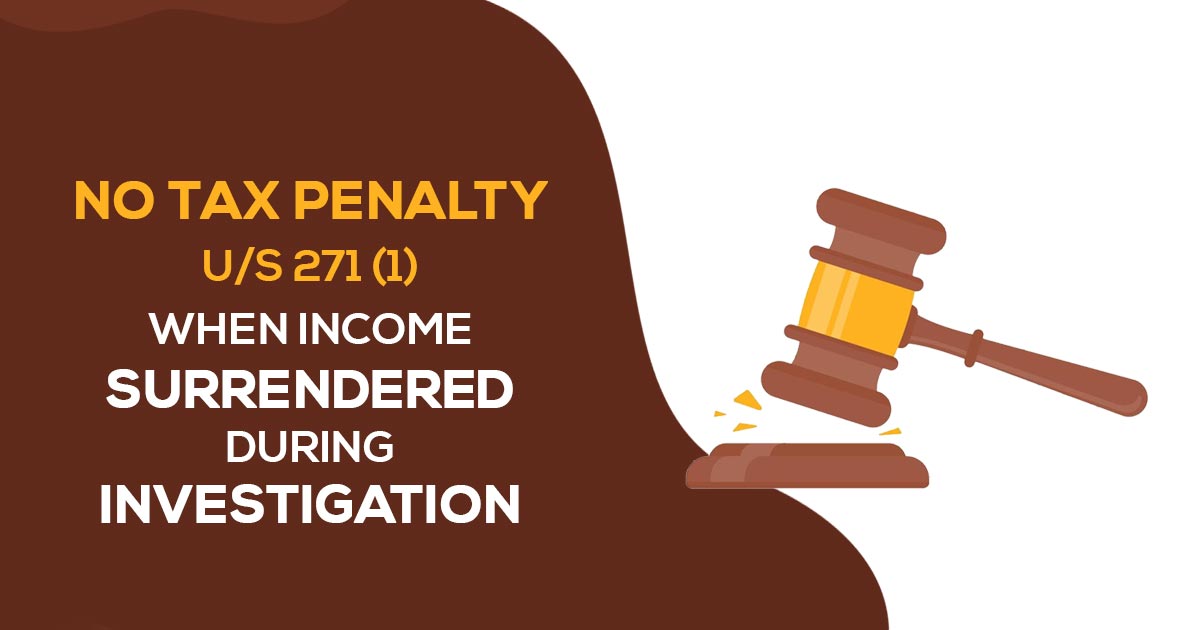
In an appeal filed before it the Income Tax Appellate Tribunal (ITAT), Ahmedabad Bench, has recently, stated that no penalty under section 271 (1) can be levied if the when income submitted via taxpayer in the investigation would have been shown in the regular income tax return filed within the due date.
Ahmedabad ITAT witnessed the aforesaid concern when an appeal was filed to it via the Revenue, against the appellate order issued via the Commissioner of Income Tax (Appeals), Ahmedabad, for partly deleting the penalty charged under Section 271(1)(c) of the Income Tax Act, 1961, relating to the Assessment Year (A.Y) 2010-11.
The assessee was a shipbreaking company, and there had been a survey action under Section 133A of the Income Tax Act in the assessee’s business premises as well as a search action under Section 132 of the Income Tax Act in the Director of the assessee company’s residential premises.
The Director of the Assessee Company showed an income of Rs. 1,80,00,000 in the hands of the Assessee Company and Rs. 20,00,000 in his own capacity throughout the course of the search. The assessee company thereafter submitted its income tax return, declaring a total income of Rs. 3,27,20,120, which included a declared income of Rs 1,80,00,000. Additionally, a routine assessment made in accordance with Section 143(3) determined the income to be Rs. 4,17,26,360.
The taxpayers have filed an appeal with the CIT(A) dissatisfied with the assessment order and receiving some partial relief. The Revenue then disputed this before the ITAT, and the ITAT returned the matter to the CIT(A)’s file for another hearing.
Therefore, in the new hearing, CIT(A) authorized the addition of Rs. 1,84,08,097/- on the basis of the case. And hence the Assessing officer would have furnished a notice under Section 271(1)(c) r.w.s. 274 of the Income Tax Act, asking the reason, not to impose the penalty on the additions of amount Rs. 1,87,70,733/- affirmed by the CIT(A) and that the minimum penalty of Rs. 62,56,911 be charged.
The Assessing Officer rejected the taxpayer’s response when it was submitted, and as a result, he imposed a minimum penalty of Rs. 62,56,911 on the taxpayers.
Dissatisfied by the penalty order, the assessee filed an appeal with the CIT(A). After reviewing the assessee’s case, the director of the assessee company’s declaration of Rs. 1,80,00,000/-, and the return of income filed with taxes paid via the taxpayer, who held that the taxpayer had not provided wrong particulars of income to the extent of Rs. 1,80,00,000.
The CIT(A) affirmed the addition for the remaining income of Rs. 4,08,097/-, however, and partially upheld the Assessee’s appeal. And it is because of this that the Revenue has filed the current appeal before the Ahmedabad ITAT.
Read Also: Delhi ITAT Removes Tax Penalty, Not Completed Basic Condition U/S of 271(1)(c)
The ITAT coram of Annapurna Gupta, the Accountant Member, and Shri T.R. Senthil Kumar, the Judicial Member post-hearing the opposing contention of both sides as furnished via Shri Sarju Mehta, the A.R. for the taxpayer, and by Shri Atul Pandy, the Sr.D.R. of the Revenue, ruled that: The Hon’ble Delhi High Court in the case of CIT vs. SAS, stated that the income which the taxpayer submitted at the time of survey would have shown via it in its regular ITR filed in the mentioned time, the penalty can be levied.
Hence CIT(A) complied with the aforesaid decision and deleted the penalty on the income declared i.e. Rs 1,80,00,000. The CIT(A) had, however, affirmed the imposition of a penalty on the remaining disputed income of Rs. 4,08,097. Therefore, we do not see any flaws in CIT(A)’s ruling, which partially removed the fine assessed under Section 271(1)(c) of the Act. The Revenue’s arguments are thus rejected because they lack validity.









